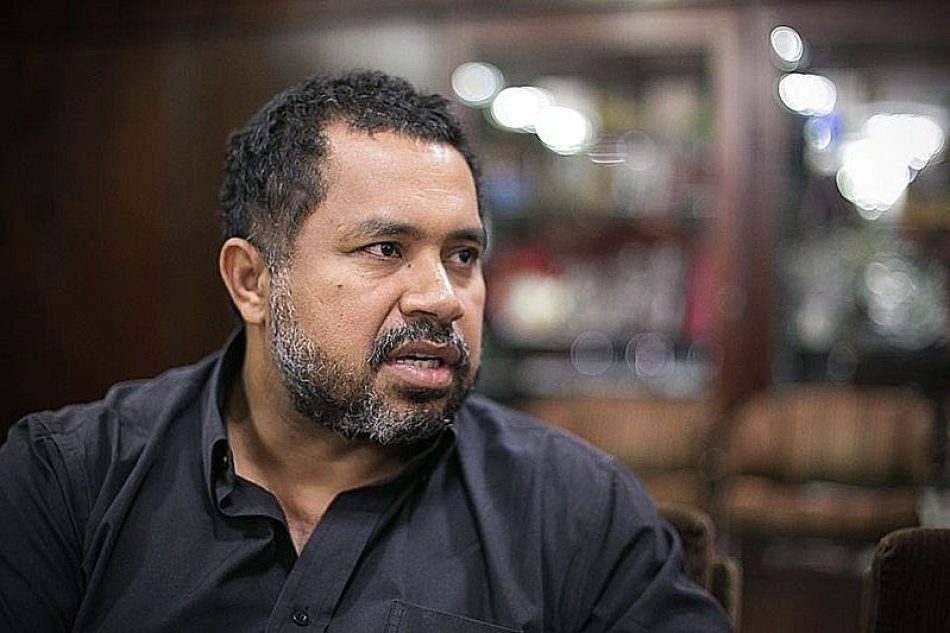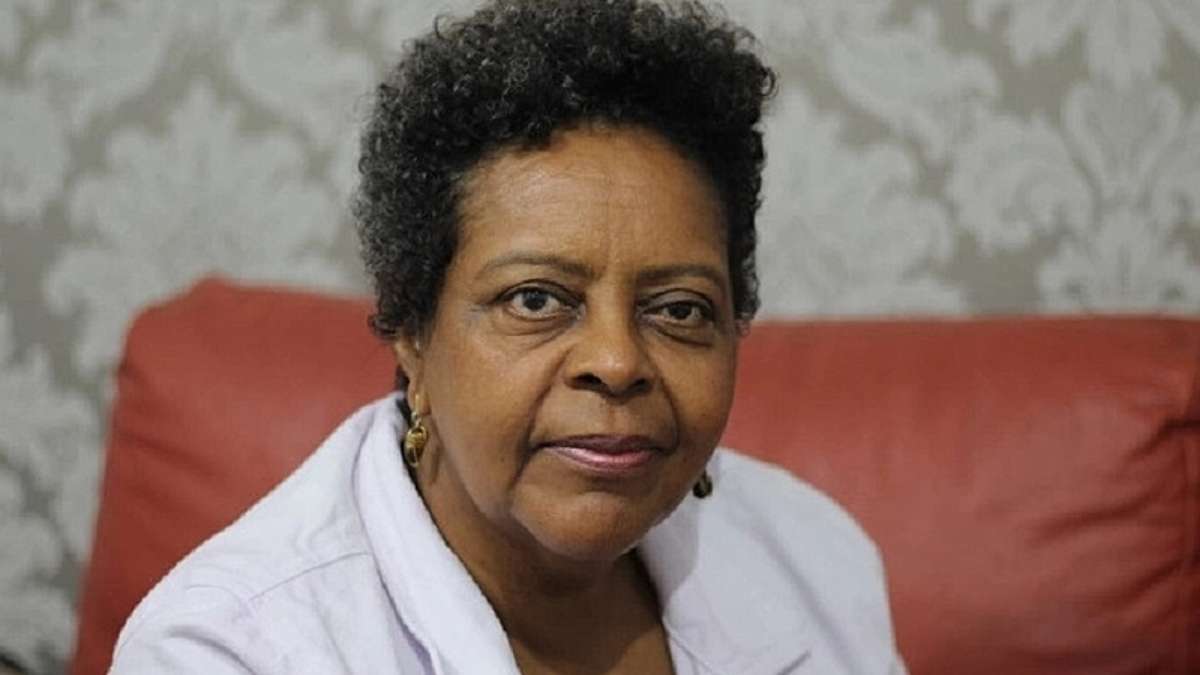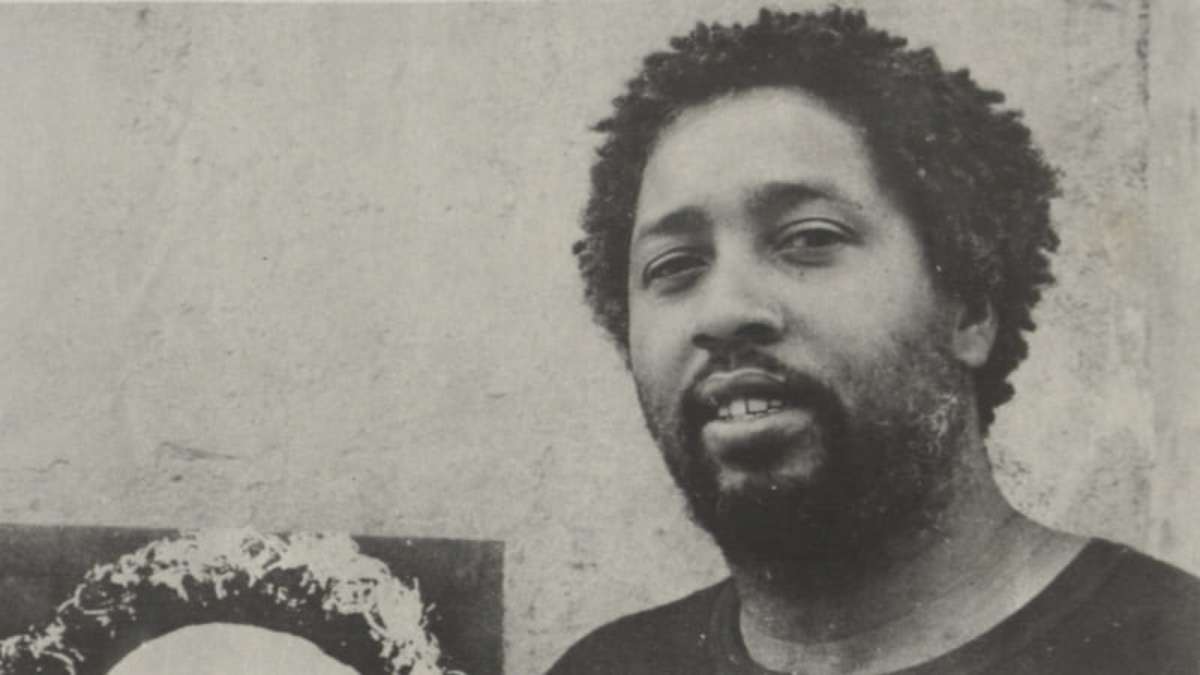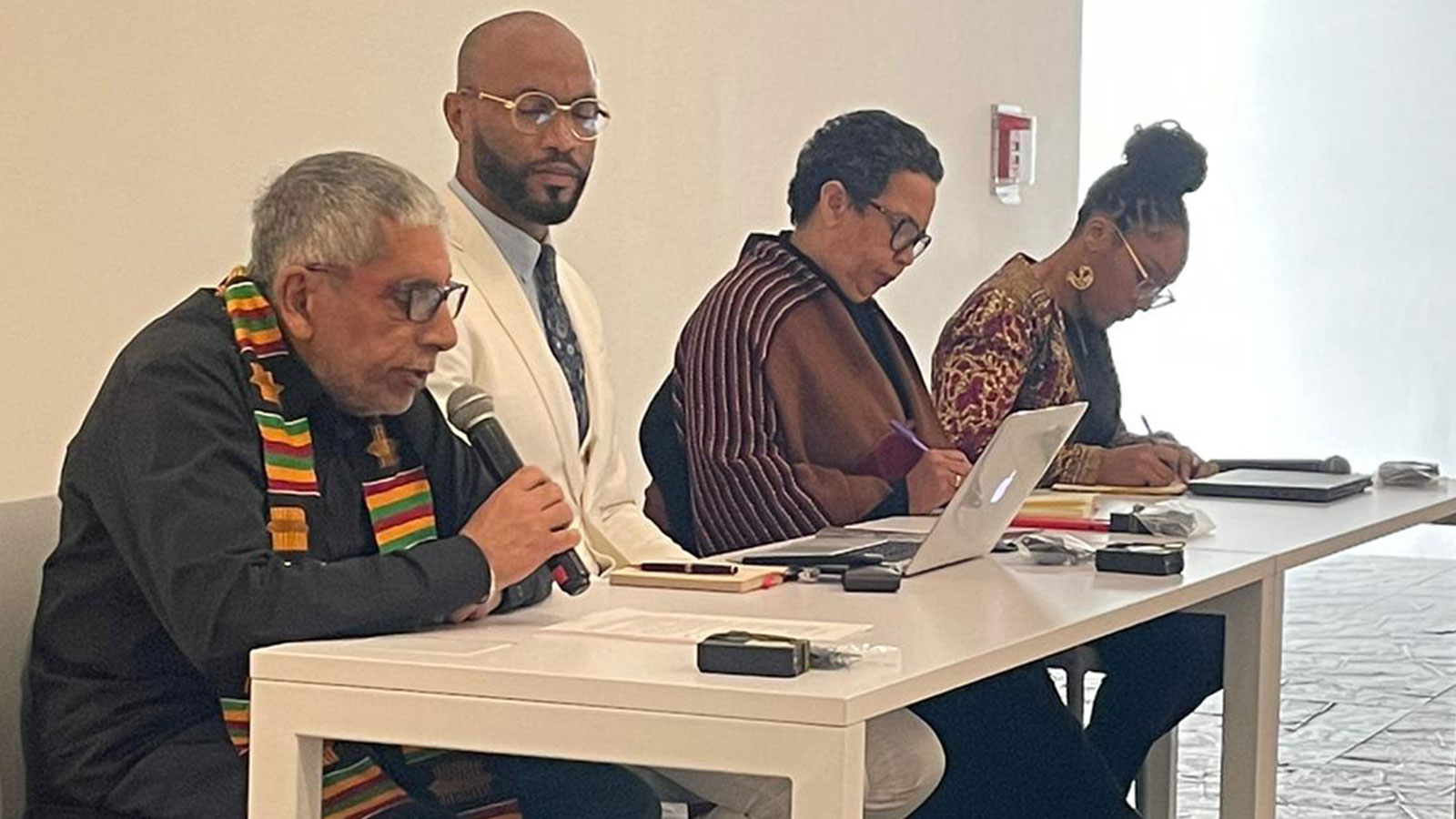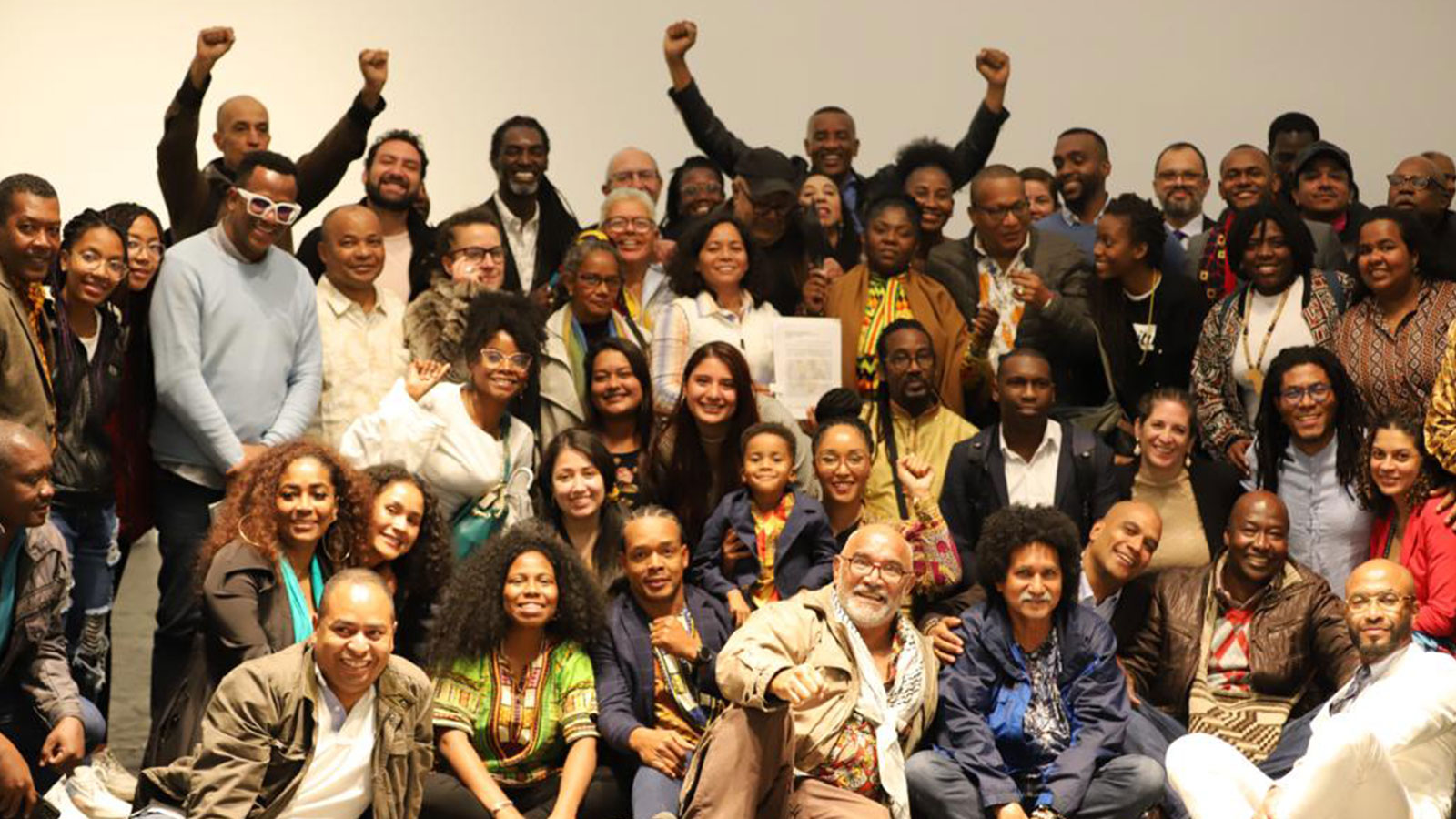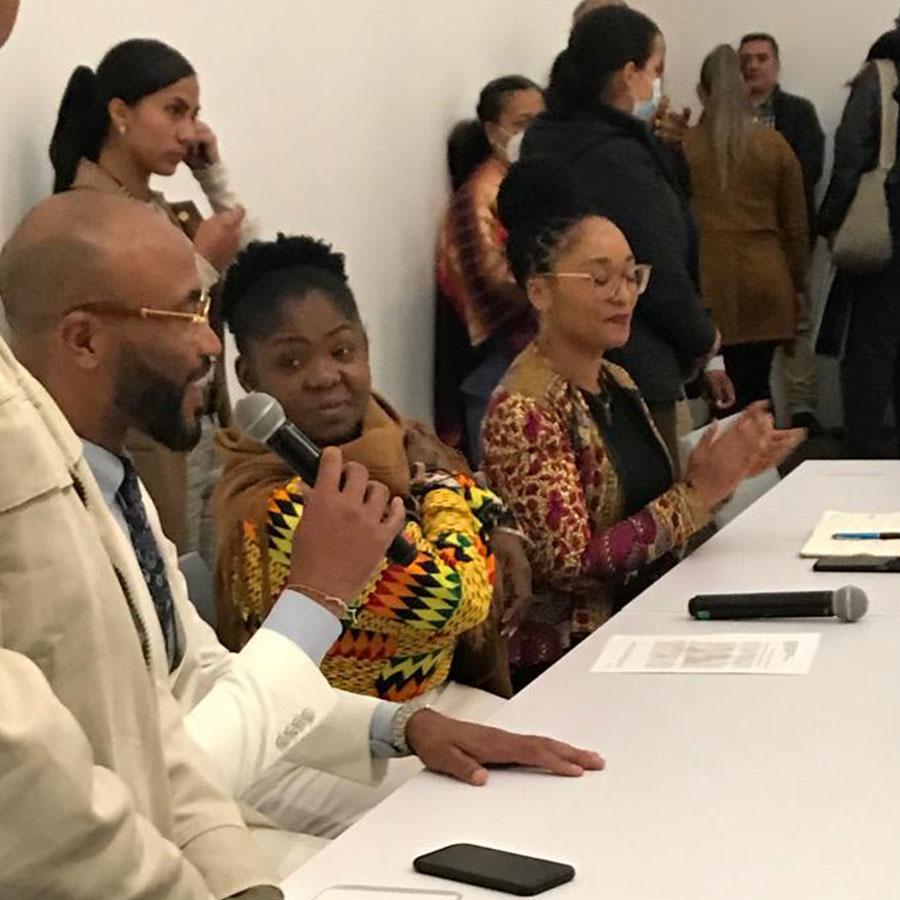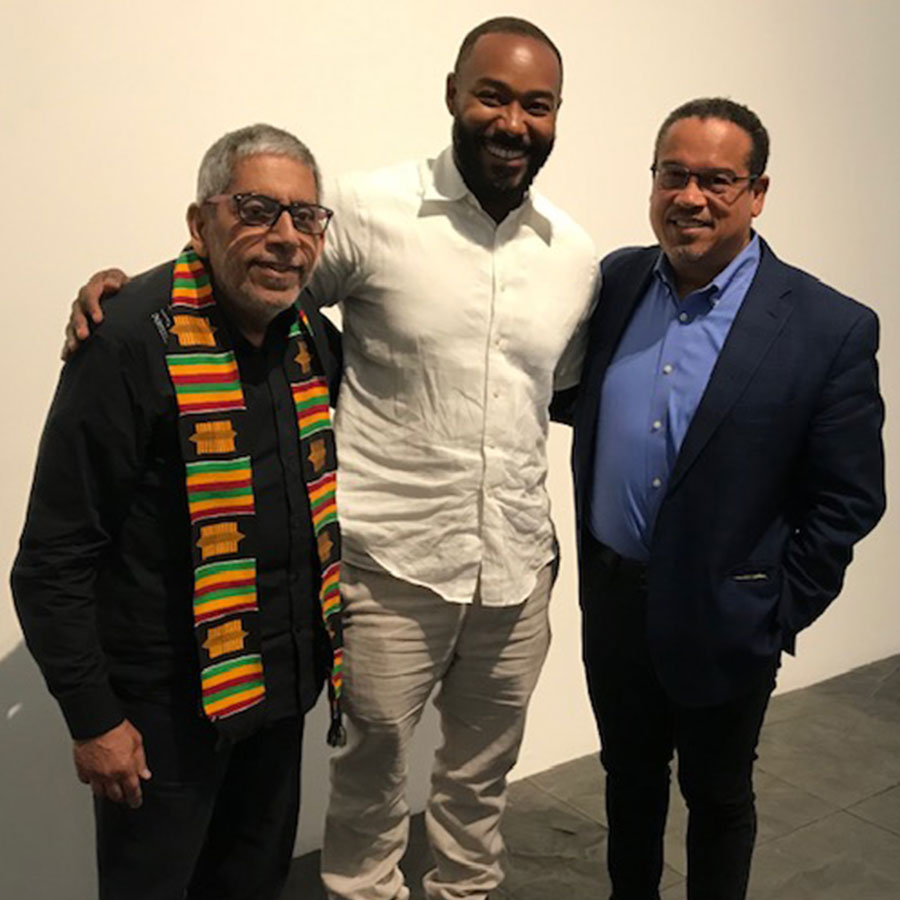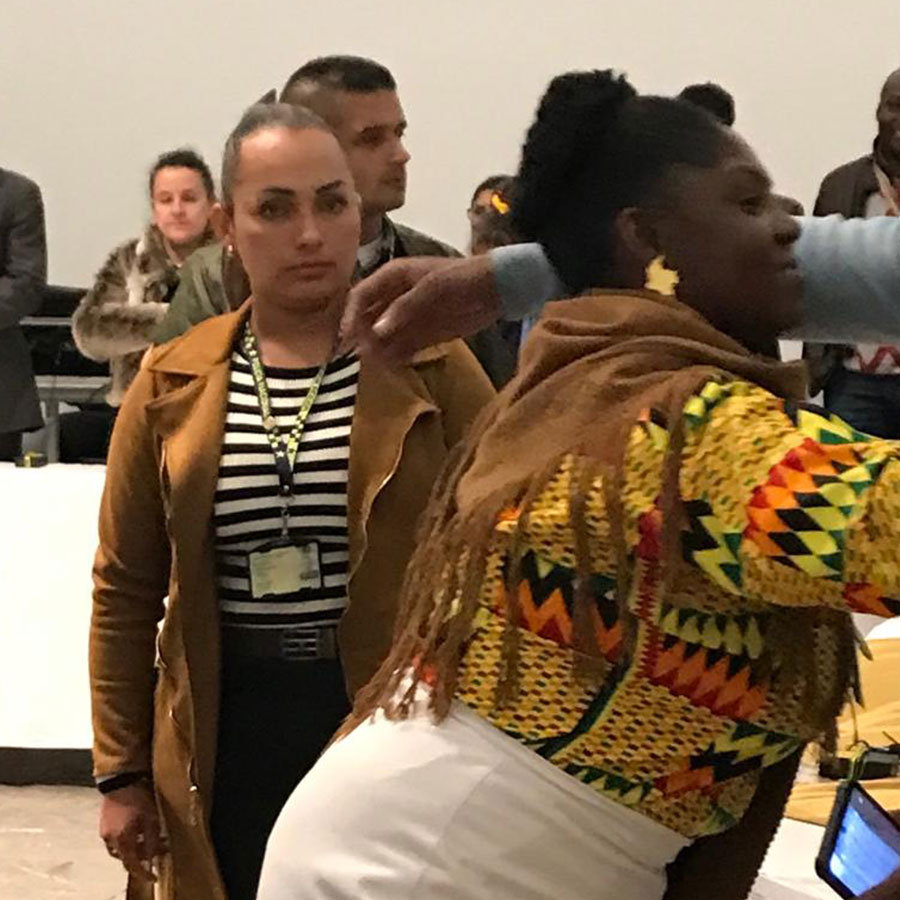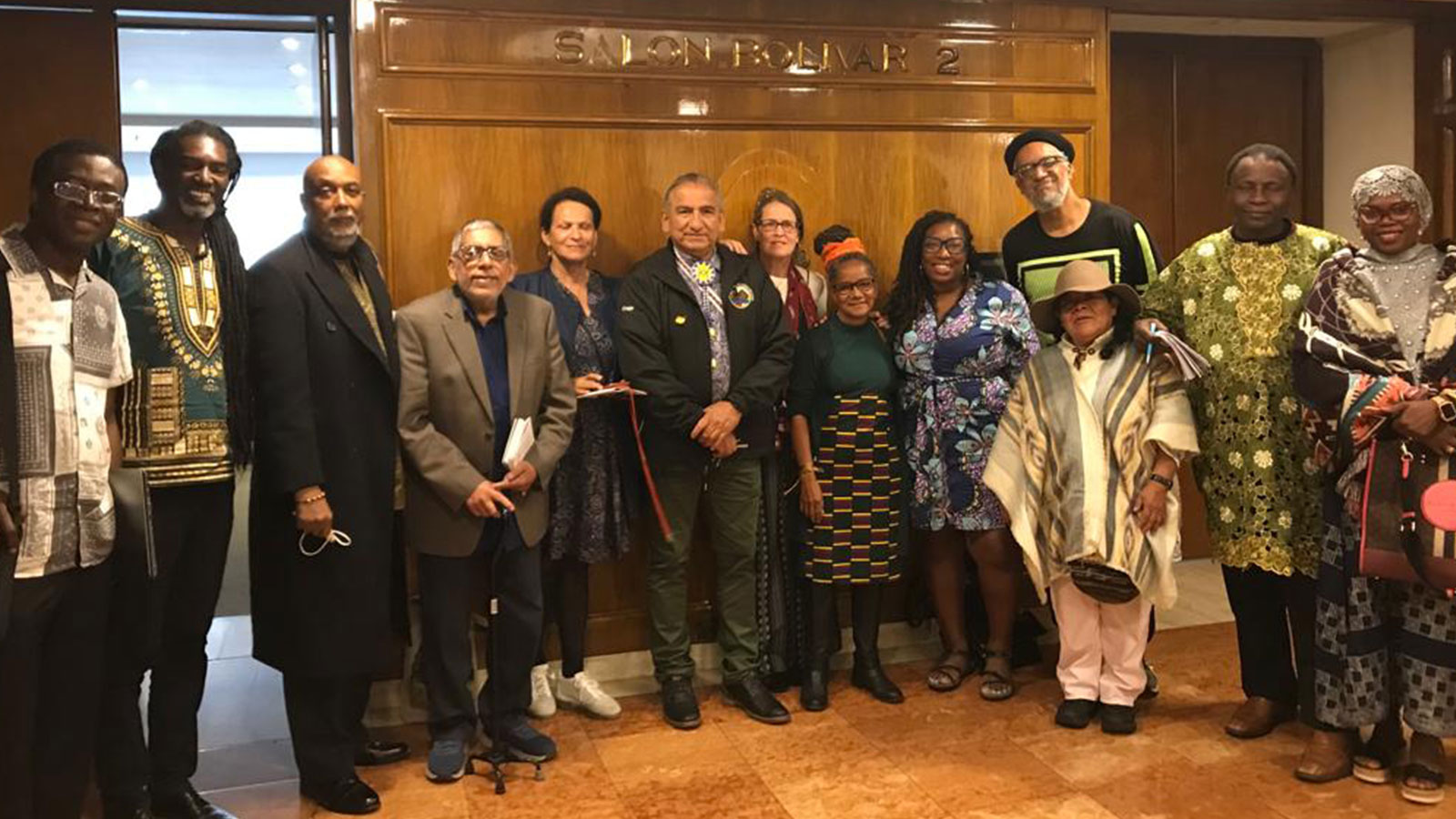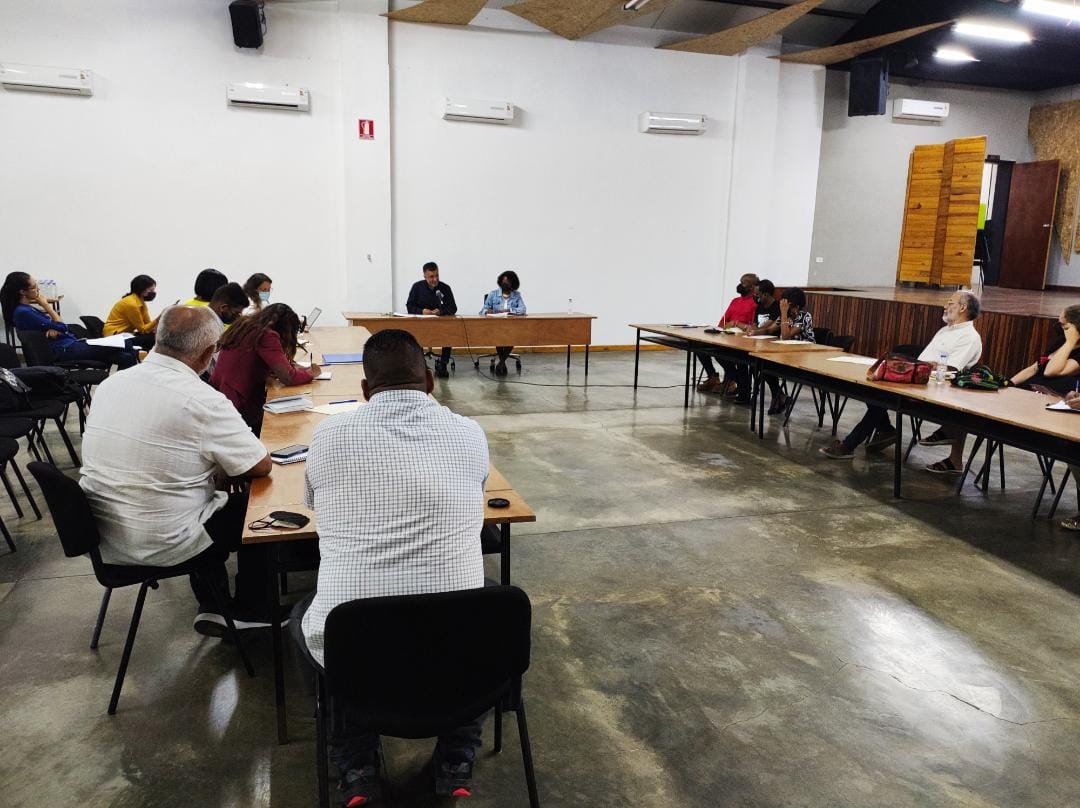Rosa Solís: the story of the “queen” who confronted Francia Márquez
16 September, 2022
By Alfredo Molano Jimeno

Rosa Emilia Solís is one of the Afro-descendant leaders with the most power in decision-making bodies before the government. Photo: Yamith Mariño
The woman who confronted the vice president in the commemoration of the 29th anniversary of Law 70 is a powerful Afro-descendant leader who drags a controversial story.
It happened in the traditional Gobelins Hall of the Palacio de Nariño. In the enclosure of the expensive French tapestries there had never been so many Afro-descendants. Vice President Francia Márquez led the celebration of Law 70. The act had begun with the presentation of the vice-presidential aides: a colonel from the Navy, one from the Army and two captains from the Air Force and the Police. All of them Afro-Colombians. An eloquent image that showed the presence at the center of power of a historically marginalized people. Suddenly, a tall, thin woman, dressed in a long skirt and turban, walked elegantly to the microphone and just before turning to the audience, stared at the vice president with a reproachful look.
“To be honest, Rosita Emilia Solís has no duty, nor any responsibility, to be in this hypocritical event”, said the woman born in Guapi, Cauca, in 1952.
The atmosphere of celebration froze. Solís took a breath and introduced himself:
“I am beautifully 70 years old and I declare myself the aunt of our vice president, because women can afford to give advice once we are 70 years old. I am not a part of the elderly, I am a beautiful old woman, and I would be wrong to come here with hypocrisy”.
Rosa Solís was invited to speak as a representative of one of the meeting instances between the government and the black communities. She launched a virulent speech of more than ten minutes in which she always referred to Francia as “niece”, without having any family ties. She said that she, Rosita Solís, “is not a nobody”, that she considers herself a “queen” and that she “does not accept the speeches of unity of black people”.
“According to many people I am the devil, I am a monster and they come to me here to speak of unity. I will never agree with unity. Who benefits from unity? In unity, only the one who has the money and the one who writes reigns. Who is going to make unity come about? I accept no one, I am not in it and I am not going to unite with anyone”, vehemently said the leader of a significant number of community councils in Valle del Cauca, where Solís extended her power by sponsoring communities between Buenaventura and the south of Chocó so they could found these councils and request collective land titles. To some extent, division has been her strategy.
In this way, she has been creating a social base of support and has been maintained for 20 years as the main interlocutor of the black communities with the governments to carry out the so-called prior consultations, both for infrastructure works and for bills and constitutional reforms. In this way, Solís became the most powerful Afro-descendant leader in the country. Francia Márquez, on the other hand, comes from the Process of Black Communities (Proceso de Comunidades Negras; PCN), an organization antagonistic to Rosa Solís whose practices they have denounced for years. For this reason, those who know the old problem were not surprised by Solís' rudeness to the vice president.
Manuel Palacios Blandón, a member — like Solís — of the Consultative Commission, denounced alleged irregularities committed by her. In a letter from 15 days ago addressed to the Minister of the Interior, Alfonso Prada, he asks him to suspend the election of a commission to study the development plan for black, Afro-Colombian, Raizal and Palanquero communities (CNARP) 2022-2026 because its “autonomy” has not been guaranteed and “there are people who are restricting the participation of delegates under all kinds of threats”.
Palacios affirms that Solís “perversely and corruptly forces” herself to be delegated to select the logistics operator for the plan and describes her as the “figure that buys and sells her brothers” and whose management is typical of “endogenous slavery that suffocates and leaves the Afro-descendant process without oxygen”. Palacios says that the Consultative period ends on October 11 and that some of its current members will be re-elected thanks to “vote buying” and that Rosa will maintain her power.
Palacios is not the only one who denounces irregular practices by Solís, but he is one of the few who dare to do so publicly. Different Afro-descendant leaders consulted by CAMBIO explained that, between 1996 and 1998, Rosa advised the creation of more than 20 community councils, several of them located in the Anchicayá river basin, “which she then fragmented into eight community councils”. The stories indicate that the history of Rosa Solís in the black movement began thanks to the fact that in the second half of the 90s, Otilia Dueñas, general manager of the Colombian Institute for Agrarian Reform (Instituto Colombiano de la Reforma Agraria; INCORA), gave her a contract to educate black communities on Law 70 in the Pacific.
“With that contract, she goes to Buenaventura and disrupts the organizational processes that the PCN had been building and creates community councils in different neighborhoods. That's why she has so much strength. While a community council promoted by the PCN brings together several communities, she creates a community council for each community. And each community council is one vote. Thanks to this, she has a majority of the votes of the community councils in Valle del Cauca and that has allowed her to be re-elected indefinitely as a member of the Board of Directors of the Regional Autonomous Corporation of Valle del Cauca (Corporación Autónoma Regional del Valle del Cauca; CVC) on behalf of the black communities of the Valley. She will also be re-elected indefinitely to the board of directors of the Pacific Environmental Research Institute (Instituto de Investigaciones Ambientales del Pacífico). These bodies are the ones that, in turn, elect the directors of these entities. And the directors are the ones who assign the resources”, says one of our sources.
Hoovert Carabalí, legal representative of the Community Council of the Black Communities of La Plata Bahía Málaga, is another Afro-descendant leader who has confronted Solís in political and judicial instances. In 2011, when the government of Juan Manuel Santos began processing the rural development bill and another one to reform the Regional Autonomous Corporations, Carabalí requested the suspension of Solís as a representative of black communities before the Colombian Institute for Rural Development (Instituto Colombiano de Desarrollo Rural; INCODER) for being involved in irregularities in her management, to title just under 3,000 hectares to the Gamboa Community Council, of which Solís was — at the same time — legal representative. The case remains bogged down since that time, but the complaint continues to exist.
That is why Carabalí is asking for the revocation of the collective land titles of two community councils created by Rosa Solís: Gamboa and La Caucana, two neighborhoods in Buenaventura. “In 2006, she created the Gamboa Community Council and the Caucana Community Council, under illegal conditions because there was no connotation of a black community in those areas. They did not comply with constitutional or legal precepts: they were not vacant, rural or coastal areas. They were areas of public interest. The councils were created illegally and she managed to unite with the mayor's office so that it agreed to her claims”, says the Buenaventura leader who has denounced her before the Prosecutor's Office and the Comptroller's Office.
The power of Rosa Solís in the spaces of Afro-descendant representation is an irrefutable reality and will be the first obstacle for the vice president to carry out the mission of the president of the republic. More so when her duties will put them face to face in the different negotiation scenarios. The president commissioned Francia to regulate Law 70, preside over the Buenaventura Development Fund, guarantee the 2017 strike agreements, coordinate the Todos Somos Pazífico Fund and be the guarantor of dialogue with ethnic communities, instances where Rosa Solís has built a kingdom she rules at will.
When consulted by CAMBIO, Rosa Solís refused to give statements and asked that the questions be sent in writing through WhatsApp to one of her collaborators. She was sent 9 questions about the accusations made about her by the sources consulted for this article, to which she replied: “I appreciate your interest in knowing my answer to the questions sent, however, I consider them accusations; therefore, after reading your article, I will reserve the right to advance the legal actions that may arise in defense of my good name, reoutation and honor”.
Rosa Solís: the story of the “queen” who confronted Francia Márquez
16 September, 2022
By Alfredo Molano Jimeno

Rosa Emilia Solís is one of the Afro-descendant leaders with the most power in decision-making bodies before the government. Photo: Yamith Mariño
The woman who confronted the vice president in the commemoration of the 29th anniversary of Law 70 is a powerful Afro-descendant leader who drags a controversial story.
It happened in the traditional Gobelins Hall of the Palacio de Nariño. In the enclosure of the expensive French tapestries there had never been so many Afro-descendants. Vice President Francia Márquez led the celebration of Law 70. The act had begun with the presentation of the vice-presidential aides: a colonel from the Navy, one from the Army and two captains from the Air Force and the Police. All of them Afro-Colombians. An eloquent image that showed the presence at the center of power of a historically marginalized people. Suddenly, a tall, thin woman, dressed in a long skirt and turban, walked elegantly to the microphone and just before turning to the audience, stared at the vice president with a reproachful look.
“To be honest, Rosita Emilia Solís has no duty, nor any responsibility, to be in this hypocritical event”, said the woman born in Guapi, Cauca, in 1952.
The atmosphere of celebration froze. Solís took a breath and introduced himself:
“I am beautifully 70 years old and I declare myself the aunt of our vice president, because women can afford to give advice once we are 70 years old. I am not a part of the elderly, I am a beautiful old woman, and I would be wrong to come here with hypocrisy”.
Rosa Solís was invited to speak as a representative of one of the meeting instances between the government and the black communities. She launched a virulent speech of more than ten minutes in which she always referred to Francia as “niece”, without having any family ties. She said that she, Rosita Solís, “is not a nobody”, that she considers herself a “queen” and that she “does not accept the speeches of unity of black people”.
“According to many people I am the devil, I am a monster and they come to me here to speak of unity. I will never agree with unity. Who benefits from unity? In unity, only the one who has the money and the one who writes reigns. Who is going to make unity come about? I accept no one, I am not in it and I am not going to unite with anyone”, vehemently said the leader of a significant number of community councils in Valle del Cauca, where Solís extended her power by sponsoring communities between Buenaventura and the south of Chocó so they could found these councils and request collective land titles. To some extent, division has been her strategy.
In this way, she has been creating a social base of support and has been maintained for 20 years as the main interlocutor of the black communities with the governments to carry out the so-called prior consultations, both for infrastructure works and for bills and constitutional reforms. In this way, Solís became the most powerful Afro-descendant leader in the country. Francia Márquez, on the other hand, comes from the Process of Black Communities (Proceso de Comunidades Negras; PCN), an organization antagonistic to Rosa Solís whose practices they have denounced for years. For this reason, those who know the old problem were not surprised by Solís' rudeness to the vice president.
Manuel Palacios Blandón, a member — like Solís — of the Consultative Commission, denounced alleged irregularities committed by her. In a letter from 15 days ago addressed to the Minister of the Interior, Alfonso Prada, he asks him to suspend the election of a commission to study the development plan for black, Afro-Colombian, Raizal and Palanquero communities (CNARP) 2022-2026 because its “autonomy” has not been guaranteed and “there are people who are restricting the participation of delegates under all kinds of threats”.
Palacios affirms that Solís “perversely and corruptly forces” herself to be delegated to select the logistics operator for the plan and describes her as the “figure that buys and sells her brothers” and whose management is typical of “endogenous slavery that suffocates and leaves the Afro-descendant process without oxygen”. Palacios says that the Consultative period ends on October 11 and that some of its current members will be re-elected thanks to “vote buying” and that Rosa will maintain her power.
Palacios is not the only one who denounces irregular practices by Solís, but he is one of the few who dare to do so publicly. Different Afro-descendant leaders consulted by CAMBIO explained that, between 1996 and 1998, Rosa advised the creation of more than 20 community councils, several of them located in the Anchicayá river basin, “which she then fragmented into eight community councils”. The stories indicate that the history of Rosa Solís in the black movement began thanks to the fact that in the second half of the 90s, Otilia Dueñas, general manager of the Colombian Institute for Agrarian Reform (Instituto Colombiano de la Reforma Agraria; INCORA), gave her a contract to educate black communities on Law 70 in the Pacific.
“With that contract, she goes to Buenaventura and disrupts the organizational processes that the PCN had been building and creates community councils in different neighborhoods. That's why she has so much strength. While a community council promoted by the PCN brings together several communities, she creates a community council for each community. And each community council is one vote. Thanks to this, she has a majority of the votes of the community councils in Valle del Cauca and that has allowed her to be re-elected indefinitely as a member of the Board of Directors of the Regional Autonomous Corporation of Valle del Cauca (Corporación Autónoma Regional del Valle del Cauca; CVC) on behalf of the black communities of the Valley. She will also be re-elected indefinitely to the board of directors of the Pacific Environmental Research Institute (Instituto de Investigaciones Ambientales del Pacífico). These bodies are the ones that, in turn, elect the directors of these entities. And the directors are the ones who assign the resources”, says one of our sources.
Hoovert Carabalí, legal representative of the Community Council of the Black Communities of La Plata Bahía Málaga, is another Afro-descendant leader who has confronted Solís in political and judicial instances. In 2011, when the government of Juan Manuel Santos began processing the rural development bill and another one to reform the Regional Autonomous Corporations, Carabalí requested the suspension of Solís as a representative of black communities before the Colombian Institute for Rural Development (Instituto Colombiano de Desarrollo Rural; INCODER) for being involved in irregularities in her management, to title just under 3,000 hectares to the Gamboa Community Council, of which Solís was — at the same time — legal representative. The case remains bogged down since that time, but the complaint continues to exist.
That is why Carabalí is asking for the revocation of the collective land titles of two community councils created by Rosa Solís: Gamboa and La Caucana, two neighborhoods in Buenaventura. “In 2006, she created the Gamboa Community Council and the Caucana Community Council, under illegal conditions because there was no connotation of a black community in those areas. They did not comply with constitutional or legal precepts: they were not vacant, rural or coastal areas. They were areas of public interest. The councils were created illegally and she managed to unite with the mayor's office so that it agreed to her claims”, says the Buenaventura leader who has denounced her before the Prosecutor's Office and the Comptroller's Office.
The power of Rosa Solís in the spaces of Afro-descendant representation is an irrefutable reality and will be the first obstacle for the vice president to carry out the mission of the president of the republic. More so when her duties will put them face to face in the different negotiation scenarios. The president commissioned Francia to regulate Law 70, preside over the Buenaventura Development Fund, guarantee the 2017 strike agreements, coordinate the Todos Somos Pazífico Fund and be the guarantor of dialogue with ethnic communities, instances where Rosa Solís has built a kingdom she rules at will.
When consulted by CAMBIO, Rosa Solís refused to give statements and asked that the questions be sent in writing through WhatsApp to one of her collaborators. She was sent 9 questions about the accusations made about her by the sources consulted for this article, to which she replied: “I appreciate your interest in knowing my answer to the questions sent, however, I consider them accusations; therefore, after reading your article, I will reserve the right to advance the legal actions that may arise in defense of my good name, reoutation and honor”.
Rosa Solís: the story of the “queen” who confronted Francia Márquez
